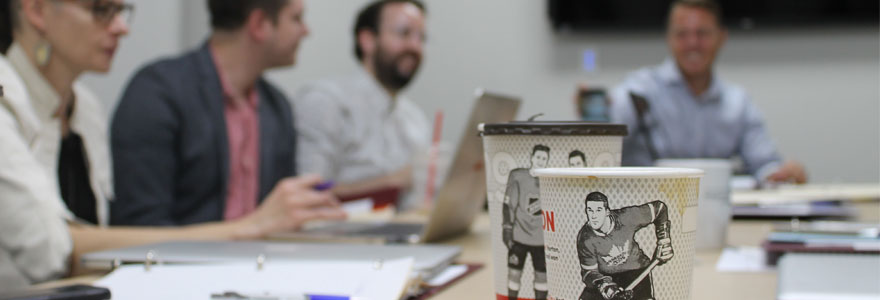News and Updates
Contact
Faculty of Social Science
Social Science Centre
Room 9438
Western University
T. 519-661-2053
F. 519-661-3868
E. social-science@uwo.ca
Inter-disciplinary researchers work to decolonize hockey
October 02, 2018
Hockey is an important part of Canada's national imagination, so much so that it even decorates coffee cups.
Photo and Story by Rob Rombouts
Hockey.
Whether it is memories of early morning games at the local rink, late-night games on a pond, or watching the Canadian men’s Olympic team beat the US team on home ice, for many people, hockey is a defining aspect of Canadian culture.
But what is being represented by that idea, and who is not represented in the standard vision and idea of Canadian hockey?
A group of eleven researchers from across Canada and across disciplines, are coming together to set the groundwork for a 5-year, SSHRC-funded study into complexity of Indigenous relations with hockey over time, entitled Decolonizing Sport: Indigeneity, Hockey, and Canadian Nationhood.
Janice Forsyth is Director of the First Nations Studies program, and Associate Professor in the Department of Sociology at Western.
“Our central goal is to change how hockey is played and understood on Turtle Island. We are a collective of researchers dedicated to uncovering and engaging with hockey’s Indigenous past, present, and future at both academic and community-engaged levels,” said Forsyth.
Forsyth said this study is the first of its kind in Canada, as it is the first sustained examination of Indigenous hockey.
“It’s a look at hockey that hasn’t been done yet,” said Forsyth. “Hockey is distinct in our national identity and because of its role in the national imagination, it’s an important discussion for reconciliation.”
Sam McKegney, Professor of English Literature at Queen’s University is the Primary Investigator for the grant.
“Hockey often functions to make settlers feel a sense of belonging,” said McKegney, “but this can erase Indigenous experiences.”
“Hockey can be community building and can foster self-worth, but it is very much combined with colonial violence,” said McKegney. “For Indigenous players, it can also provide a means of entry into settler culture.”
“Hockey is so often a way to talk about Canada but is often limited to white, heterosexual males,” said Jamieson Ryan, a PhD student in English at Queen’s University. “We want to complicate that erasure so when you say hockey it is not just a synonym for white, heterosexual male.”
The team has tentatively defined five aspects they will be investigating, in order to develop an understanding of the meaning of hockey in different groups and communities of Indigenous people.
One aspect will look at youth in hockey, and the experience of player development. Specifically, Professor Robert Henry from University of Calgary will look at the space of the bus, and its potential as a vehicle for reconciliation and decolonization.
Another area of study will look at Indigenous female experiences in hockey.
“So little is known about it,” said Forsyth. “The intent is to stop erasure of female experiences by starting with a socio-demographic profile of who plays.”
The group will be interviewing Indigenous NHL or pro-level hockey players to learn about the experiences they went through playing pro and getting to that level.
McKegney will research the experience of Indigenous Rec hockey, especially adult players, to develop auto-ethnographies. This area of research will focus on both Indigenous specific teams, and teams made up of Indigenous and non-Indigenous players.
The group will also be looking at the historiography of hockey, how hockey has been tied to Canadian nationalism, and “how hockey has been tracked as a settler enterprise, and the implications of such nationalistic sentiments, at a moment of reconciliation,” said McKegney.
“Through archival research, personal interviews, and Indigenous community-led approaches, augmented by statistical analysis, we take up hockey as a site of potential community building and Indigenous empowerment, as well as a site for the pursuit of reconciliation between Indigenous and mainstream Canadian populations,” said Forsyth.
The research team consists of:
- Janice Forsyth, Associate Professor, Sociology & Director of First Nations Studies, Western (Co-Applicant)
- Taylor McKee, PhD student, Kinesiology, Western
- Andrew Pettit, PhD student, Kinesiology, Western
- Robert Henry, Assistant Professor, Sociology, University of Calgary (Co-Applicant)
- Alicia Clifford, MA student, Sociology, University of Calgary
- Shane Keepness, PhD student, Indigenous Governance, University of Victoria
- Sam McKegney, Associate Professor, English, Queen’s University (Principal Investigator)
- Jamieson Ryan, PhD student, English, Queen’s University
- Mike Gauthier, PhD, Aboriginal liaison officer, Corrections Canada
- Rick Monture, Assistant Professor, Indigenous Studies and English, McMaster University
- Devi Mucina, Assistant Professor, Indigenous Governance, University of Victoria (Co-Applicant)
Related stories:

